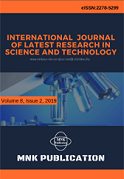DOI:10.29111/ijlrst ISRA Impact Factor:3.35
Open Access
International Journal of Latest Research in Science and Technology Vol.9 Issue 2, pp 18-21,Year 2020
Correspondence should be addressed to :
Received : 17 April 2020; Accepted : 28 April 2020 ; Published : 30 April 2020

| Download | 127 |
|---|---|
| View | 187 |
| Article No. | 10990 |
In order to study the role of KCTD12 in breast cancer, the tissue microarray and bioinformatics methods were used. At the same time, in vitro we used MDA-MB-231 a cell line of breast cancer to research the influence of KCTD12 on breast cancer cells, the ability of proliferation and colony formation of 231 which with over expression KCTD12 were detected. At last we used the method of synchronization preliminary to discusse the mechanism of KCTD12 regulated the cell cycle and promoted the formation of breast cancer. We found that KCTD12 was highly expressed in breast cancer tissues and that patients with high KCTD12 expression had low survival rate. At the same time, in vitro experiments also confirmed that KCTD12 promoted cell proliferation and enhanced the ability of cell colony formation. Meanwhile, by means of synchronization, we found that KCTD12 was ubiquitination in S phase, which may be the reason for its regulation of cell cycle.
Copyright © 2020 Ying Zhong * et al. This is an open access article distributed under the Creative Commons Attribution 4.0 International (CC BY 4.0) license which permits unrestricted use, distribution, and reproduction in any medium, provided the original work is properly cited.
Ying Zhong *, Dongling Zhang , Huifeng Li , " The Ubiquitination Of Kctd12 In S Phase Promotes The Formation Of Breast Cancer ", International Journal of Latest Research in Science and Technology . Vol. 9, Issue 2, pp 18-21 , 2020

MNK Publication was founded in 2012 to upholder revolutionary ideas that would advance the research and practice of business and management. Today, we comply with to advance fresh thinking in latest scientific fields where we think we can make a real difference and growth now also including medical and social care, education,management and engineering.

We offers several opportunities for partnership and tie-up with individual, corporate and organizational level. We are working on the open access platform. Editors, authors, readers, librarians and conference organizer can work together. We are giving open opportunities to all. Our team is always willing to work and collaborate to promote open access publication.

Our Journals provide one of the strongest International open access platform for research communities. Our conference proceeding services provide conference organizers a privileged platform for publishing extended conference papers as journal publications. It is deliberated to disseminate scientific research and to establish long term International collaborations and partnerships with academic communities and conference organizers.